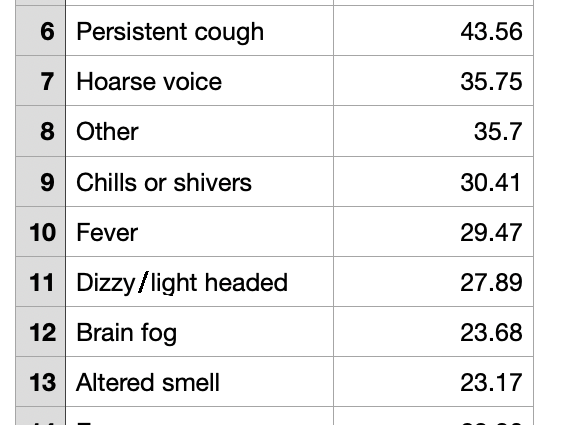Turinys
Fever, cough, loss of taste or smell are the three most common symptoms associated with COVID-19. But beware, Omikron has changed this picture a bit. In the superwariant infection, these symptoms became less frequent, and three other ailments came to the fore. This change poses the risk that, based on the “classic three” of COVID-19 symptoms, we will not recognize the infection in time. What should you pay attention to to prevent this from happening? What are the most common symptoms of Omikron? We explain.
- In the case of Omikron infection, typical symptoms of COVID-19, i.e. fever, cough and loss of taste or smell, appear less frequently – as shown by analyzes in approx. Half of patients
- Symptoms such as headache, sore throat, runny nose have come to the fore. What other symptoms may appear during an Omicron infection?
- Knowing the symptoms of COVID-19 will help you diagnose the problem quickly and implement appropriate measures, however, the symptoms are only an indication of a possible cause. Therefore, it is important to consult a doctor about disturbing signals
- Daugiau informacijos rasite „TvoiLokony“ pagrindiniame puslapyje
Infection with Omicron produces slightly more symptoms than previous mutations
Vaccinations against COVID-19, adherence to the principles of DDM (disinfection, distance, masks), as well as frequent airing of rooms are the main tools in the fight against the spread of the coronavirus. Being able to recognize the symptoms of an infection is also of great importance. Thanks to this, it is possible to isolate as quickly as possible, test oneself and, as a result, cut the pathogen’s pathways.
Over the months of the pandemic, we’ve learned to associate COVID-19 with the classic three symptoms: fever, cough, and loss of taste or smell. Omikron does not fit this picture. Soon after discovering this super-variant, doctors noticed that it showed slightly symptoms than previous mutations. The typical COVID-19 signals mentioned above have become less frequent, and other ailments – very similar to the common cold – have come to the fore.
Tolesnė dalis po vaizdo įrašu.
Scientists from the British ZOE COVID Symptom Study (records reports from millions of UK users with COVID-19, making it possible to track changes in symptoms during a pandemic) warn that “many people remain unaware of all the symptoms that we should watch out for”. As a result, people can interpret their ailments as signs of a cold, while it will be COVID-19.
- Klastingi Omikron simptomai. Jei juos pastebėsite, nedelsdami atlikite testą
Classic COVID-19 symptoms rare with Omikron infection. What to watch out for?
The symptoms experienced by people with Omikron infection were analyzed by scientists from the aforementioned ZOE COVID Study program. The three classic symptoms of COVID-19 (fever, cough, loss of taste / smell) were reported by half of the patients. The leading ones turned out to be headache, sore throat and runny nose. Parents of children with Omikron infection have similar observations. The most common symptom experienced by young patients was the headache. Interestingly, most children also experienced the classic symptoms of COVID-19, including fever and coughing.
The headache as a symptom of Omicron was pointed out by Dr. Angelique Coetzee, who detected this superwariant. In an interview with Sky News, she explained that this symptom appears to be more “intense” in unvaccinated patients.
Ar buvote užsikrėtę COVID-19 ir nerimaujate dėl šalutinio poveikio? Patikrinkite savo sveikatą, atlikdami išsamų sveikstančiųjų tyrimų paketą.
The above symptoms do not exhaust the signals that may indicate an infection with Omicron. Analyzes of reports submitted using the ZOE COVID Study application show that, in addition to headache, throat and runny nose, fatigue and sneezing are also common symptoms.
- Delta prieš Omikroną. Kokie yra simptomų skirtumai? [TALLY]
In a situation where Omikron spreads around the world, it is also worth knowing which symptoms are the most common and which are less common. Such a list was prepared by Insider (also based on data from the ZOE COVID Study, as of January 5, 2022).
10 symptoms of Omikron infection – in order of the most common:
Qatar – 73 percent
Headache – 68 percent
Fatigue – 64 percent
Sneezing – 60 percent
Sore throat – 60 percent
Persistent cough – 44 percent
Hoarseness – 36 percent
Chills – 30 percent
Fever – 29 percent
Dizziness – 28 percent
Symptoms are just a guide. How to recognize COVID-19?
All of the above information is intended to reduce the risk of confusing coronavirus infection with a cold. However, these are only guidelines and should not be relied upon as a reliable method of diagnosing the disease or the variant causing the infection. Hence, it is so important to consult a doctor for each ailment that worries us, the more so as the symptoms may vary individually and shape depending on the immunity state of a given person or the level of vaccination.
- Namų testai dėl COVID-19. Kaip juos padaryti? Kokių klaidų vengti?
Diagnostic tests (nasopharyngeal swab for RT-PCR or quick antigen test) will provide certainty whether we are dealing with a cold or a coronavirus. It should also be remembered that the disease can also be asymptomatic. Initial estimates say that in the case of Omikron, 30 percent. infections may be of this nature.
Jums gali būti įdomu:
- Teigiamas namų testas dėl COVID-19. Ką daryti toliau? [ME PAAIŠKINAME]
- Daugiau informacijos apie „Omikron“ papildomą parinktį. BA.2 mums pavojingas? Mokslininkai atsako
- Kas suteikia jums puikų atsparumą COVID-19? Du keliai. Mokslininkai ištyrė, kuris iš jų buvo veiksmingesnis
MedTvoiLokony svetainės turinys skirtas pagerinti, o ne pakeisti Svetainės Vartotojo ir jo gydytojo kontaktą. Svetainė skirta tik informaciniams ir edukaciniams tikslams. Prieš vadovaudamiesi specialiomis žiniomis, ypač medicininėmis žiniomis, esančiomis mūsų svetainėje, turite pasikonsultuoti su gydytoju. Administratorius neprisiima jokių pasekmių, kylančių dėl Svetainėje esančios informacijos naudojimo. Ar jums reikia gydytojo konsultacijos ar el. recepto? Eikite į halodoctor.pl, kur gausite pagalbą internetu – greitai, saugiai ir neišeidami iš namų.










